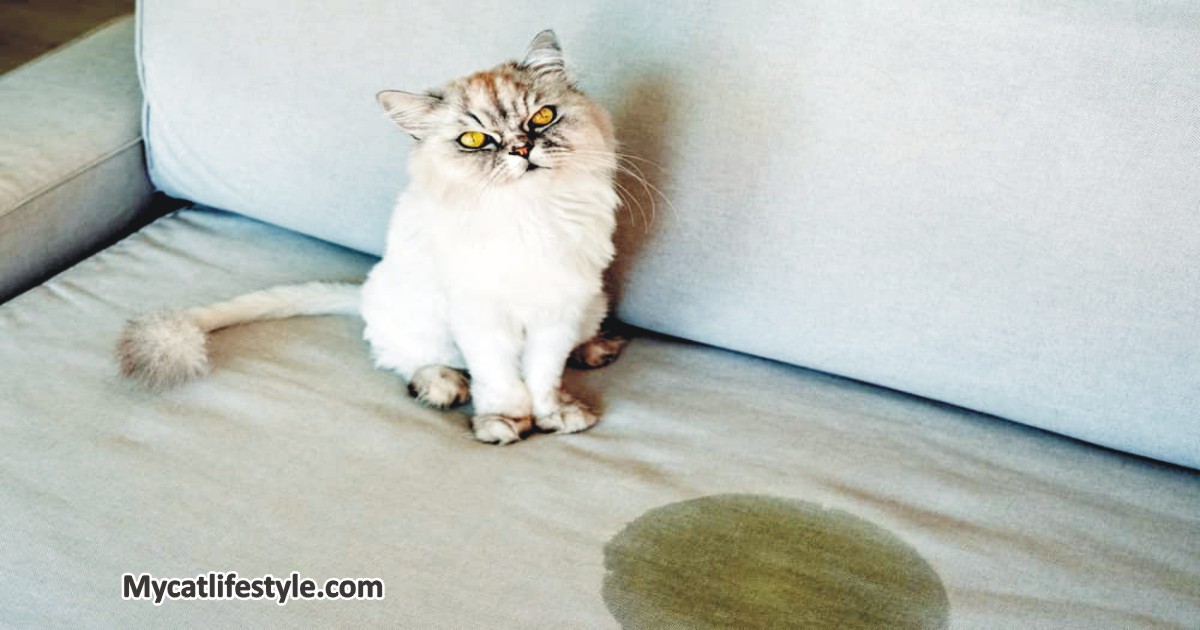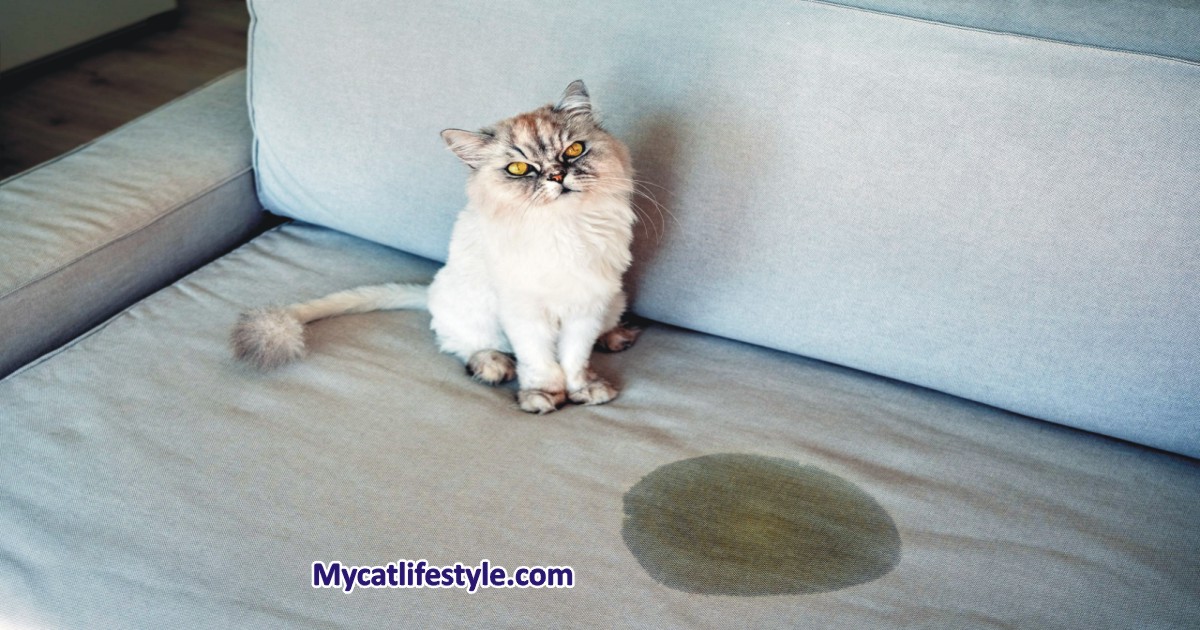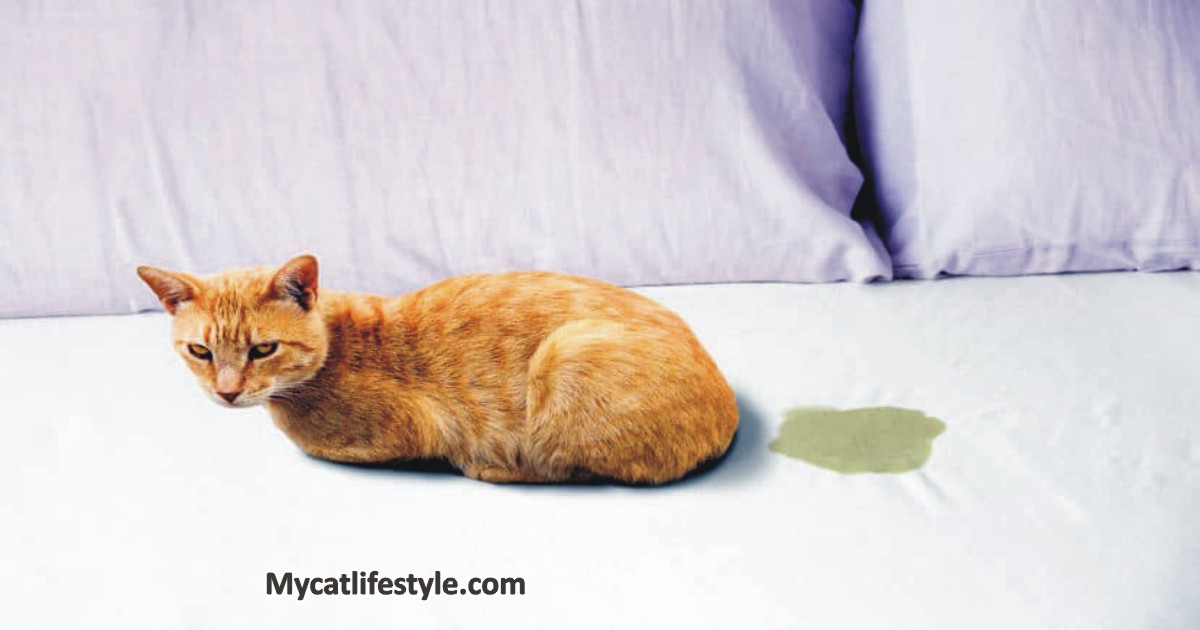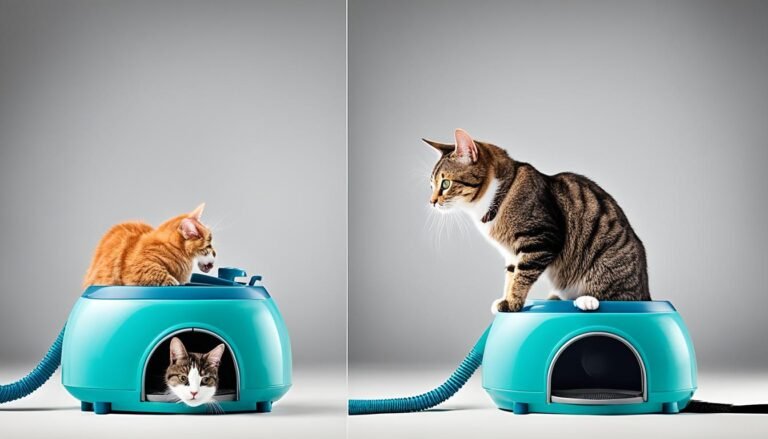Why Do Cats Pee When Scared?

If you are a cat owner, it is likely that you see your cat pee only in the litter box. Occasionally, however, you may notice the presence of feline pee on the floor or the sofa, while your cat is conspicuously absent. What occurred?
There are several factors that might have contributed to this occurrence, but one possibility is that your feline companion experienced a state of fear in response to a stimulus. Felines have the ability and tendency to urinate while experiencing fear. To effectively manage and prevent the occurrence of recurring messes, it is crucial to understand the underlying reasons behind them.In this article, we examine the common reasons cats pee when they’re scared and what you can do to calm them down.

Why Do Cats Pee When Scared? First, Rule Out Medical Conditions
A cat that is urinating outside of the litter box should be examined by a veterinarian to rule out medical complications. Although the peeing may be caused by fear, you should eliminate any potential health problems before trying to determine the cause.
Occasionally, cats will pee in strange places to alert you to potential problems, such as Urinary Tract Infections or painful crystals in the urine. If your veterinarian has cleared your cat of any health concerns, you can treat the issue as a behavioral one.

Reasons Why Cats Pee When Scared?
If you believe that your cat is peeing when they are scared, knowing why they are doing it can help you prevent it from occurring again. It is important to be patient and understanding when dealing with a scared cat. Although you may not be able to prevent them from peeing when they are scared every time, you can at least prepare yourself for this possibility.
They can’t help themselves
When cats are startled, they may pee involuntarily. In most cases, this results in just a small puddle beneath the cat and is not a complete release of the bladder. Cats who are easily scared and are already stressed are more likely to experience this.
Sudden, loud noises may cause this loss of bladder control. There is also the factor of age to consider. If your cat is a kitten or an elderly senior, its bladder control may be weaker. The likelihood of a scared, elderly cat peeing is greater than that of a scared, adult cat. It can, however, occur in cats of all ages

Marking their territory
When a cat is scared, it may pee as a way to mark its territory. Peeing is not done immediately, as is usually the case with involuntary peeing. It is more controlled, and the cat decides to do it after spending a long period of time in a frightened state.
The majority of scared peeing occurs when you bring another cat into the home or move into a new home. Initially, your cat may be scared by this change, but as they become accustomed to their new environment, the fear will subside. A cat suffering from anxiety will mark its territory in an attempt to establish ownership and soothe their discomfort.
Cats feel safe in places that smell similar to their own. Cat pee contains pheromones that cats are able to distinguish from others. By marking their surroundings, they are able to make them smell like themselves to provide comfort.
Fighting isn’t their goal
When a scared cat meets another cat, even if it’s one they usually live with, they might pee as a way to say “I don’t want to fight” and show they’re not looking for trouble. Cats do have their tiffs, but when one starts peeing, it means things are getting too intense.
If you see this happening a lot, it might mean the cats didn’t get enough time to properly meet and get comfortable with each other at first. A good idea is to give them a bit of space from each other and then slowly bring them back together over a few weeks. This can help your scared cat realize the other cat isn’t out to get them.
Spaying/Neutering and Scared Cats’ Urination
Cats that have not been spayed or neutered are more inclined to use urination as a territory-marking behavior, and this action can intensify if they are scared. The state of being unaltered is not the only reason a scared cat may urinate outside its litter box, but it certainly exacerbates the situation.

How to Calm a Scared Cat

Knowing how to calm and support your cat when it’s frightened is essential, and there are numerous methods to help ease your pet’s anxiety.
- Provide Them with Their Own Space
- It’s crucial for cats to have a designated area where they feel safe and comfortable.
- Establish a spot where your cat can retreat to relax.
- Consider adding scratch posts, toys, or their favorite items to this space to help them find solace when they’re feeling anxious or scared.
Do Not Force It to Socialize
Forcing a frightened cat to interact can be detrimental. It’s better to let your cat become accustomed to new faces and environments at its own pace. They will seek out interaction when they feel secure again, so patience is key during their adjustment period.
Be Calm in Stressful Situations
Maintaining your composure when your cat is anxious or upset is important. If your cat is receptive, gentle petting or cuddling can help alleviate its stress. Remember, if you appear anxious, your cat may mirror your emotions, potentially prolonging its recovery time.
Additional Tips:
- Establish a consistent routine
- Minimize or eliminate the sources of fear
- Follow your cat’s lead and allow them to explore or retreat as they prefer

How to Stop a Cat From Peeing When Scared?
Addressing your cat’s fear and helping it navigate through stressful situations is paramount. Here’s what you can do if your cat resorts to peeing due to fear:
- Consult Your Veterinarian
- Increase Love and Playtime
- Cuddle Your Cat
- Ensure a Safe Environment at Home
- Clean Marked Areas Thoroughly
- Keep the Litter Box Clean
- Remember, peeing due to fear may indicate a health problem, so keep your vet informed about your cat’s situation.
Causes of Fear in Cats
Cats can feel threatened by a variety of things in their environment, often leading to stress. Common triggers include:
- Encounters with other animals
- New people and environments
- Loud noises like thunder and fireworks
- Trips to the vet
- Changes in living situations
Being observant of your cat’s reactions to these triggers can help you provide the necessary support.

Signs of a Scared Cat
Recognizing the signs of fear in your cat is crucial for timely intervention. Here are some behaviors to watch for:
- Over-grooming
- Avoiding eye contact
- Dilated pupils
- Head turning away
- Seeking hiding places
- Ears pulled back
- Body leaning or shrinking away
- Increased breathing rate
- Staying frozen in one spot
- Aggressive behaviors (hissing, scratching)
- Staring intently at something
- Loss of bladder control
- Running or hiding
- Tail tucking
Being aware of these signs and responding to them can help prevent further stress and potential health issues related to fear.
READ ALSO THIS : My Cat Has A Urinary Tract Infection
How to Best Help a Stressed Cat

Should your cat exhibit signs of urination due to fear, arranging a veterinary appointment is a critical first step. This ensures any underlying health issues can be excluded. For cases of severe anxiety, your vet may suggest specific medications to aid in calming your pet.
Investigating the cause of your cat’s stress is crucial. By pinpointing the source, you can better prepare for and mitigate potential stress-inducing situations. This foresight is particularly valuable for impending events known to cause stress, such as relocations or the arrival of a new pet. There’s a wealth of information available to support your cat through these transitions.
At times, the stressor might be something as straightforward as a litter box problem or a visiting neighborhood cat. Identifying and addressing these issues can make a significant difference in your cat’s comfort level.
For ongoing issues that seem beyond your ability to manage, seeking the guidance of a cat behaviorist could prove invaluable. These specialists can offer personalized advice and strategies for improvement. Your vet can refer you to a qualified behaviorist, and this service may even be covered by your pet insurance.

If Nothing Works
Continued signs of stress, fear, and inappropriate urination signal that your cat is deeply troubled by something in their surroundings. If the specific cause is elusive, it’s important to discuss further strategies with your veterinarian. Your cat may benefit from medication to ease their anxiety or manage their bladder function.
Remember to consider your cat’s history, especially if they were not with you from a young age. Cats with backgrounds of neglect or mistreatment may require a longer period to adjust to their new environment and build trust. Providing a safe, patient, and understanding space is crucial for their adjustment and well-being.
READ ALSO THIS : Why Has My Cat Started Peeing On The Bed?
Frequently Asking Question
Is it normal for cats to pee when scared?
Yep, it’s pretty normal for cats to pee if they’re scared. Imagine if you were super scared and couldn’t express it with words; cats feel the same way and sometimes, peeing is how they show they’re really frightened.
Why do cats pee when stressed?
When cats feel stressed, they might pee because it’s their way of saying, “I’m not okay!” Stress messes with their little heads, and peeing somewhere other than their litter box is one way they deal with those big feelings.
Do cats pee as a defense mechanism?
Indeed, they do. Peeing can be like their personal alarm system. It’s their way of marking their territory, saying, “This is mine, back off!” especially when they’re feeling threatened or want to avoid a confrontation.
Do cats spray pee when scared?
Yes, cats might spray pee when they’re scared. Spraying is a bit different from just peeing because it’s more about sending a message. It’s like they’re putting up a sign that says, “I’m scared, so respect my space!”
Final Thoughts
Urination due to fear in cats highlights their level of stress and discomfort. After eliminating any potential medical reasons behind this behavior, the focus shifts to aiding your cat in managing their stress and fear. Adaptation to change varies from one cat to another, with some requiring more time to adjust.
It is our hope that the strategies shared here empower you to support your cat, helping them to cease peeing out of fear and feel more at ease within your home.





